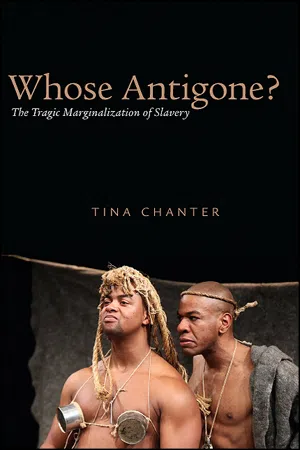
- 275 pages
- English
- ePUB (mobile friendly)
- Available on iOS & Android
About this book
In this groundbreaking book, Tina Chanter challenges the philosophical and psychoanalytic reception of Sophocles' Antigone, which has largely ignored the issue of slavery. Drawing on textual and contextual evidence, including historical sources, she argues that slavery is a structuring theme of the Oedipal cycle, but one that has been written out of the record. Chanter focuses in particular on two appropriations of Antigone: The Island, set in apartheid South Africa, and Tègònni, set in nineteenth-century Nigeria. Both plays are inspired by the figure of Antigone, and yet they rework her significance in important ways that require us to return to Sophocles' "original" play and attend to some of the motifs that have been marginalized. Chanter explores the complex set of relations that define citizens as opposed to noncitizens, free men versus slaves, men versus women, and Greeks versus barbarians. Whose Antigone? moves beyond the narrow confines critics have inherited from German idealism to reinvigorate debates over the meaning and significance of Antigone, situating it within a wider argument that establishes the salience of slavery as a structuring theme.
Frequently asked questions
- Essential is ideal for learners and professionals who enjoy exploring a wide range of subjects. Access the Essential Library with 800,000+ trusted titles and best-sellers across business, personal growth, and the humanities. Includes unlimited reading time and Standard Read Aloud voice.
- Complete: Perfect for advanced learners and researchers needing full, unrestricted access. Unlock 1.4M+ books across hundreds of subjects, including academic and specialized titles. The Complete Plan also includes advanced features like Premium Read Aloud and Research Assistant.
Please note we cannot support devices running on iOS 13 and Android 7 or earlier. Learn more about using the app.
Information
Table of contents
- Title Page
- Preface
- 1 Introduction: The Shadowy Others of Antigone's Legacy
- 2 Antigone's Liminality: Hegel's Racial Purification of Tragedy and the Naturalization of Slavery
- 3 The Performative Politics and Rebirth of Antigone in Ancient Greece and Modern South Africa: The Island
- 4 Exempting Antigone from Ancient Greece: Multiplying and Racializing Genealogies in Tegonni: An African Antigone
- 5 Agamben, Antigone, Irigaray: The Fetishistic Ruses of Sovereignty in Contemporary Politics
- 6 Concluding Reflections: What If Oedipus or Polynices Had Been Slaves?
- Synopses of The Island and Tegonnis
- Notes
- Bibliography